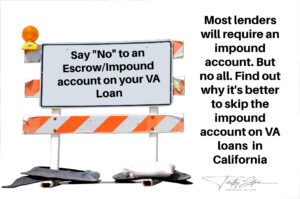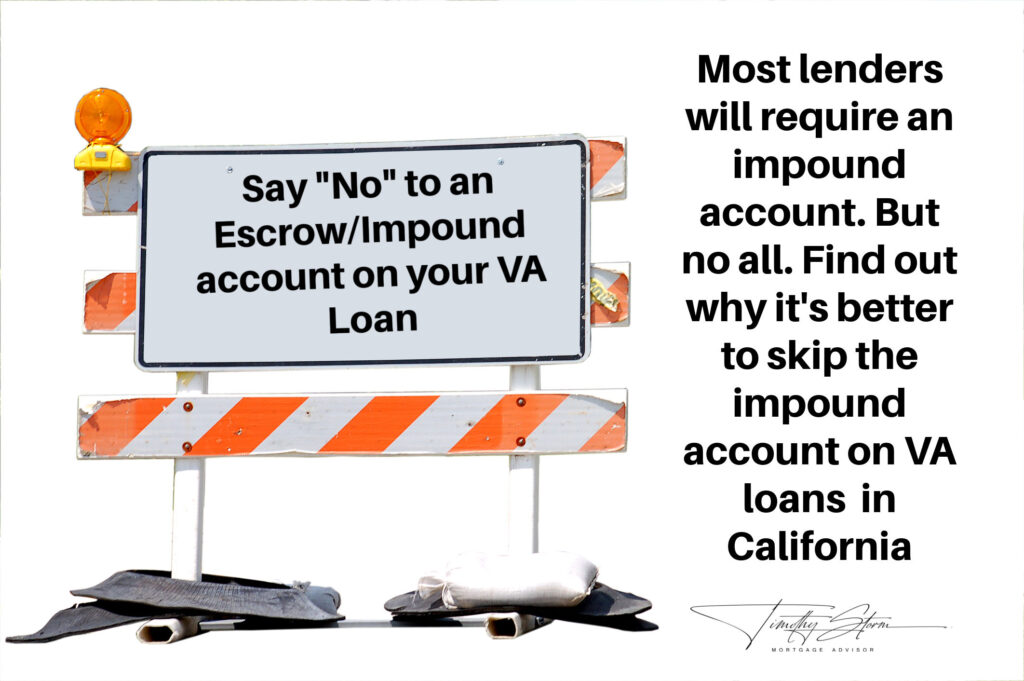 99.9% of VA lenders require an impound/escrow account for property taxes and insurance to be part of a VA loan. But it’s not something that VA requires. It’s just a lender requirement. Here’s the good news: You can get a VA loan and not have an impound/escrow account. But why is that a good thing in California? Skipping the escrow account does not change the VA calculation for debt to income ratio. But it does lower the amount of funds needed to close.
99.9% of VA lenders require an impound/escrow account for property taxes and insurance to be part of a VA loan. But it’s not something that VA requires. It’s just a lender requirement. Here’s the good news: You can get a VA loan and not have an impound/escrow account. But why is that a good thing in California? Skipping the escrow account does not change the VA calculation for debt to income ratio. But it does lower the amount of funds needed to close.
What is an Escrow Account?
An Escrow Account, also known as an Impound Account, is essentially a forced “savings” account. When the loan closes, a certain amount is deposited into the Escrow Account to be held by the lender. This amount is to cover future property tax and insurance bills. It sounds like a good idea. For someone concerned about their ability to budget for those bills, having an escrow account will ensure, at least in theory, that the funds will be available when those bills come due. For a California Veteran who knows how to budget their money, giving control of these two bills to the lender may not be the preferred way to go, especially in California.
When is Home Owners Insurance due?
When a California Veteran closes escrow to buy their home, the new homeowner’s insurance policy premium is paid for the year. Also, an additional 3 months’ worth of insurance is deposited into the Escrow Account at closing. Homeowners insurance is renewed once a year, typically on the anniversary of the initial home purchase date. Homeowners insurance premiums in California have gone up quite a bit in the last few years due to several factors. Wildfires have been the biggest reason for the recent increase. As the annual premiums increase, the monthly mortgage payment also rises if the insurance is paid from the Escrow Account. Let’s assume the annual insurance premium at the time of the home purchase is $1,800 per year. This means the lender will collect $150 monthly from the Veteran as part of their mortgage payment. After 12 mortgage payments, there will be $1,800 in the Escrow Account, which should be enough to pay the next year’s insurance bill. However, if the insurance premium goes up in the following year by $600, then there will be a shortage of funds in the Escrow Account. The Veteran borrower will have two choices. They can either cover the $600 shortage immediately or have 1/12 of it added to their payment the following year. But remember, the payment will already increase by $50 due to the increase. So, to cover the increase and the shortage, the payment would need to increase by $100. It gets confusing. In this case, the veteran would probably be best off paying the $600. this way, their payment would only increase by $50.
When are California Property Taxes Due
In California, property taxes are due twice a year. The First Half is due November 1 but can be paid until December 10 to avoid a late penalty. The Second Half is due February 1 but can be paid April 10 to avoid a penalty. Property taxes are based on a calculated tax rate plus other assessments. The tax rate is a percentage of the Assessed Value of the property. The base tax rate in California is 1% of the Assessed Value. Determining Assessed Value is where California veers off course from other states, and this is why Escrow Accounts in California are mismanaged most of the time by loan servicers, who don’t seem to understand how California property taxes work.
How is Assessed Value Determined?
In nearly every other state, a property’s assessed value is determined by the county using a formula based on its assumed value. In some states, the value will adjust annually, and in some states, it may only adjust every three years. The homebuyer (and the lender) know what the property tax bill will be at the end of the year. In California the Assessed Value changes when there is a change of ownership. For example, let’s assume Johnny Veteran purchases a home for $800,000 in California. The previous owner has lived in the property for 15 years and the assessed value was $400,000. The county will reassess the property beginning on the first day of ownership. Assuming a base tax rate of 1%, the previous owner’s annual tax bill was $4,000. Johnny Veteran’s tax bill will be $8,000 per year. Johnny’s loan was set up with an Escrow Account payment for property taxes of $667 ($8,000 / 12 = $667). And this is where the Loan Servicer messes it up.
When the first tax bill is issued, the county has not yet adjusted the Assessed Value on the tax bill. So, a bill of $4,000 is sent to the lender for payment. A separate bill, the Supplemental Tax Bill, is sent to Johnny. The Supplemental bill covers the difference between the previous owner’s tax bill and what Johnny’s tax bill should have been. The Supplemental Tax bill, in this case, is $4,000. Johnny thought there would be no surprises since he has an Escrow Account, but now he has to come up with $4,000 to pay the unsecured Supplemental tax bill.
To make matters worse, the Loan Servicer now thinks they are collecting too much for property taxes, lowering Johnny’s payment. Johnny thinks, “Well, I had to pay $4,000, but at least my payment dropped”. However, in a year, Johnny will have a huge shortage in his impound account, and the payment will be increased to cover it.
Say “No” to Escrow Accounts if you can
If you are a Veteran buying a home in California with VA financing, avoid having an Escrow Account if you can. Most lenders require it, but one that I know of will waive it, even with $0 down financing on a VA loan. Not having an Escrow Account will lower the funds needed to close and lower your monthly payment. Just make sure to budget for the property taxes and homeowners insurance on your own. Create a separate savings account specifically for taxes and insurance. That is the best way to ensure you have the funds to pay those bills when they come due.
If your lender requires an Escrow Account, call me at 949-829-1846. I can offer VA loans with no Escrow/Impound Account. You will also receive a detailed VA Purchase Analysis and answers to all of your questions.
Authored by Tim Storm, a California VA Loan Officer specializing in VA Loans. MLO 223456. – Please contact my office at Arbor Financial Group NMLS 236669. My direct line is 714-478-3049. I will prepare custom VA loan scenarios that will match up to your financial goals, both long and short-term. I also prepare a Video Explanation of your scenarios so that you can fully understand the numbers BEFORE starting the loan process specializing in VA Loans. MLO 223456

